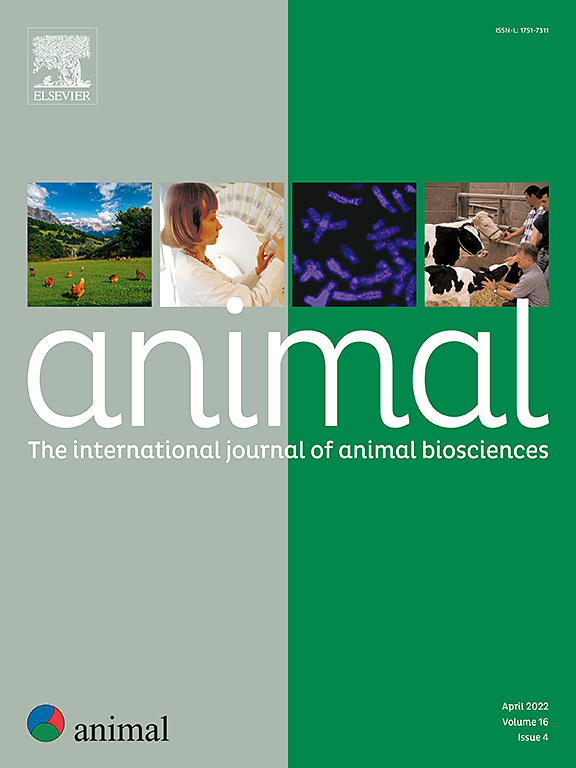动物委员会邀请审查:欧洲动物养殖系统的生物文化视角
IF 4.2
2区 农林科学
Q1 AGRICULTURE, DAIRY & ANIMAL SCIENCE
引用次数: 0
摘要
欧洲的景观是通过自然过程和人类活动的复杂相互作用而演变的,其中之一是畜牧业;因此,历史上创造了丰富的生物和文化多样性的生物文化景观。然而,农业集约化忽视并改变了动物在景观中的作用,并破坏了更广泛的动物养殖系统创造可持续景观的潜力,作为高度工业化和高密度动物生产的替代方案,这是造成广泛环境权衡的原因。我们提出了一个生物文化多样性(BCD)框架,从社会生态的角度强调动物养殖系统对景观可持续性的贡献。通过对三个欧洲案例研究——德国泥炭地恢复、地中海野火控制和阿尔卑斯地区干草奶生产——应用生物文化的视角,我们展示了动物养殖系统如何有助于生物多样性保护、气候适应能力和文化价值。我们讨论了使用BCD框架发展科学方法的必要性,以将对动物养殖的看法从威胁转变为可持续发展的解决方案。我们的案例强调了生物文化方法如何允许对人与自然关系进行全面评估,促进可持续实践和应对环境挑战。其益处包括创造多功能景观、保护生物多样性、增强遗传多样性以及保护传统知识和文化遗产。然而,传统做法的减少危及了这些好处。为了在欧洲及其他地区的景观中释放动物养殖系统的潜力,我们呼吁在动物科学方面采取更加综合和跨学科的方法。基于生物文化的评估可以为动物养殖系统向以动物为基础的解决方案的转变提供信息,从而在全球范围内实现景观的可持续性。本文章由计算机程序翻译,如有差异,请以英文原文为准。
Animal board invited review: A biocultural perspective of animal farming systems in Europe
Europe’s landscapes have evolved through the intricate interplay of natural processes and human activities, one of which is animal farming; thus, historically creating biocultural landscapes rich in biological and cultural diversity. However, agricultural intensification has neglected and altered the role of animals within landscapes, and undermines the potential of more extensive animal farming systems to create sustainable landscapes, as an alternative to highly industrialised and high-density animal production, which is responsible for a wide range of environmental trade-offs. We present a biocultural diversity (BCD) framework to emphasise the contributions of animal farming systems to landscape sustainability from a social-ecological perspective. By applying a biocultural lens across three European case studies —peatland restoration in Germany, wildfire control in the Mediterranean, and hay milk production in the Alpine region— we demonstrate how animal farming systems can contribute to biodiversity conservation, climate resilience, and cultural values. We discuss the need for evolving scientific approaches using a BCD Framework to shift the perception of animal farming from a threat to a solution for sustainability. Our cases highlight how a biocultural approach allows for a comprehensive evaluation of human-nature relationships, promoting sustainable practices and addressing environmental challenges. Benefits include creating multifunctional landscapes, conserving biodiversity, enhancing genetic diversity, and preserving traditional knowledge and cultural heritage. However, a decline in traditional practices jeopardises these benefits. To unlock the potential of animal farming systems within landscapes in Europe and beyond, we call for more integrated and transdisciplinary approaches in animal sciences. Biocultural-grounded assessments can inform the transformation of animal farming systems towards animal-based solutions for achieving landscape sustainability on a global scale.
求助全文
通过发布文献求助,成功后即可免费获取论文全文。
去求助
来源期刊

Animal
农林科学-奶制品与动物科学
CiteScore
7.50
自引率
2.80%
发文量
246
审稿时长
3 months
期刊介绍:
Editorial board
animal attracts the best research in animal biology and animal systems from across the spectrum of the agricultural, biomedical, and environmental sciences. It is the central element in an exciting collaboration between the British Society of Animal Science (BSAS), Institut National de la Recherche Agronomique (INRA) and the European Federation of Animal Science (EAAP) and represents a merging of three scientific journals: Animal Science; Animal Research; Reproduction, Nutrition, Development. animal publishes original cutting-edge research, ''hot'' topics and horizon-scanning reviews on animal-related aspects of the life sciences at the molecular, cellular, organ, whole animal and production system levels. The main subject areas include: breeding and genetics; nutrition; physiology and functional biology of systems; behaviour, health and welfare; farming systems, environmental impact and climate change; product quality, human health and well-being. Animal models and papers dealing with the integration of research between these topics and their impact on the environment and people are particularly welcome.
 求助内容:
求助内容: 应助结果提醒方式:
应助结果提醒方式:


